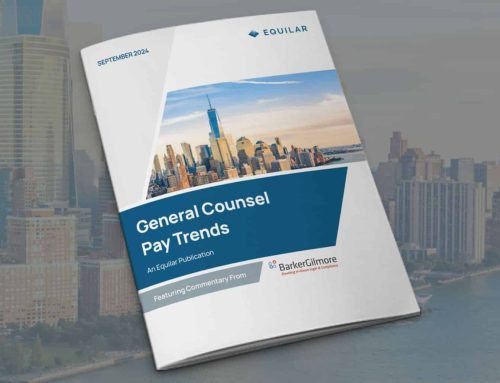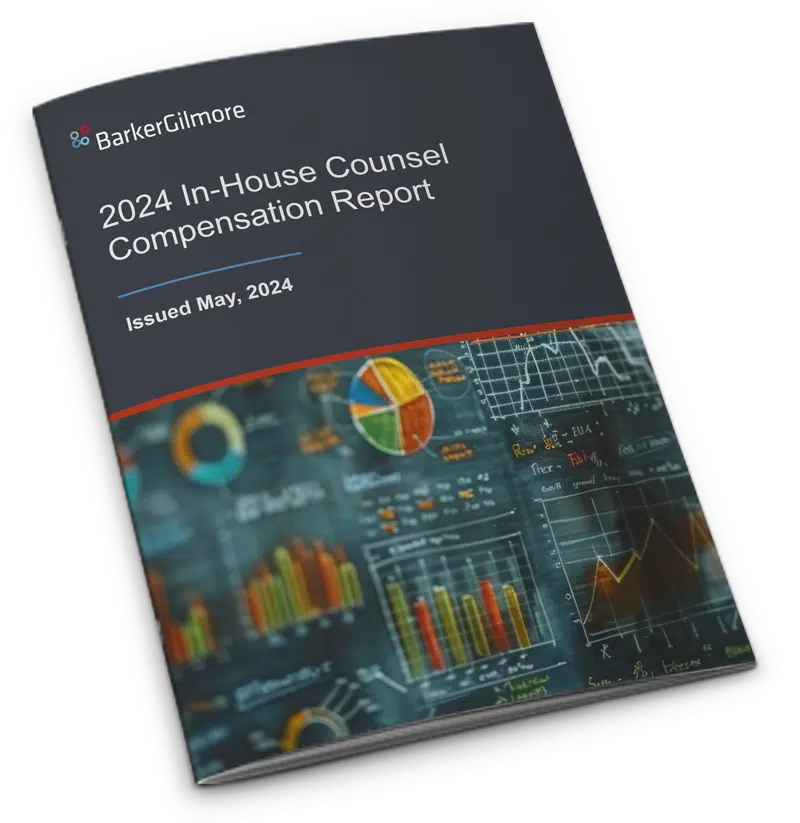BarkerGilmore Strategic Advisor and Coach Ann Harlan (Former Vice President, General Counsel and Corporate Secretary, The J.M. Smucker Company) talks with two former CEOs, Jenniffer Deckard and Kevin McMullen, to share insights on specific skills and traits that CEOs look for and value in a General Counsel as a trusted business partner.
Start with a successful working relationship.
Creating an effective and trusting business relationship with your CEO goes beyond the well-honed legal skills that you worked so hard to develop. In fact, what it takes is similar to how you build a meaningful relationship with anyone, whether a colleague, spouse, or a friend. To be successful, focus on enhancing your ability to:
- Develop a candid two-way dialogue. Mutual respect is based on integrity, honesty, and credibility.
- Show humility. Admit when you don’t know an answer to something and go find it out. No one expects you to have all of the information at your fingertips, especially at the beginning of a new working relationship.
- Be a good listener. This is high on the list of attributes for a GC since it’s important to not only understand what someone is saying, but also what’s behind what they are saying.
- Think like an owner. Business acumen is essential, so take the time to learn the business, grounding yourself in the business drivers and realities that you are trying to provide legal counsel on before you do so.
- Be a great team player. Build strong relationships with your peers on the executive team because they are your customers, too. These relationships can be as critical as those with your CEO and board.
The first 90 days in your new role are critical.
Understanding expectations from the CEO’s vantage point, and how you as a new GC and member of the executive team can fulfill those expectations, is vital to creating a successful relationship.
- Effectively communicate to gather information that will help you read the executive leadership “barometer.”
- Develop a cadence with the CEO and the leadership team. For example, everyone has a different level of risk tolerance, so ascertain the CEO’s risk appetite as it will impact how you approach the job.
- Learning the business and doing your research are also essential within this initial timeframe, but it’s most important to really get to know the CEO and the team.
- Start with a proactive plan that addresses how you and the CEO will operate and how frequently you will communicate.
What expectations does the board have of you as GC?
Board members rely on trust in the GC as an individual as well as in the partnership between the GC and the CEO. This trust must extend not only to the GC’s character and expertise, but to how they manage processes and relationships within the organization. The GC must work to establish trust with the board, allowing them to concentrate on other matters, confident in the knowledge that the GC is working hard to protect the interests of the organization.
Be aware of potential pitfalls.
Acknowledging that we all have blind spots, there are some pitfalls that a GC might unintentionally fall into if not prepared. These may include:
- Not taking the time to understand the business first and coming up with answers that do not reflect the reality of the business; this will erode your credibility.
- Focusing exclusively on the CEO and board as your clients at the expense of key customers in other functional areas and members of the leadership team.
- Listing pros and cons, but not taking a stance or providing a recommendation on an issue.
- Seeing the world in black and white as opposed to appreciating and integrating the nuances of a situation.
How to make sure the CEO views you as a strategic advisor.
Be a bold and no-nonsense general counsel who is willing to bring the tough topics to the CEO. Be willing to raise the flag on tough issues and challenge both the team and the CEO. Gaining credibility with the entire leadership team will also strengthen your position. Do your homework, gather input from across the organization, effectively evaluate the situation, and you will continue to build the CEO’s confidence in you over time.
Learn even more from the Q&As presented during the webinar.
Attendees submitted questions to our distinguished panel and their answers provide additional insights and a variety of useable and practical tips to help you develop a more effective working relationship with your CEO.
1. There are times when a GC’s role creates disagreement among members of a company’s management team in the areas of business judgment and overall enterprise risk. Do you have any suggested best practices for balancing the board’s need to be informed with the GC’s role as a collaborative member of the management team?
It is not unusual for members of an executive team to have different opinions about how best to address an issue or to execute on strategy. Those differences often lead to better outcomes and it is important to air those differences in the context of a management meeting. It is also important to present one unified vision to the board absent major issues. It is only those times when the GC believes that the course of action taken puts the company at risk of breaking a law or running afoul of a regulation or another obligation where the GC has a difficult decision to make. At the end of the day, the GC has a legal and ethical obligation to voice concerns, but, in reality, those situations are rare.
2. How important is it to come across as a senior leader versus a senior lawyer leader?
Our view is that it is possible, and important, to come across as both. To be viewed as a leader as part of an executive business team is critical, and to carve out a role as a trusted legal advisor is also critical. The two are not mutually exclusive. The best GCs do both naturally.
3. Should a GC be involved in HR and personnel matters?
A successful GC will build trust on the front end so that when there is an issue, the HR team will naturally come to the appropriate legal professional as a resource to help resolve issues. HR matters should be a natural place for a GC to be viewed as a partner rather than an “after-the-fact report.” This doesn’t mean that HR has to consult someone in the legal department on every matter but rather that there is a trusting relationship.
4. What are the biggest areas to focus on when joining a new company (employment, contracts, etc.)? Do you take that guidance top down or do an evaluation first to determine highest areas of risk?
The biggest areas of focus will depend on what type of business you are joining, the management style, etc. A manufacturing company with large long-term contracts will be very different than a software company with hundreds of licensing arrangements. A company that often resorts to litigation to resolve issues will require a very different focus than a business that is hesitant to engage in litigation. Areas of focus will be driven by additional factors of management style, regulatory pressures, and even the financial condition of the company. The best analysis of where to focus energy will come both from the senior leadership team, a review of past legal activities, and general information gleaned from “managing by walking around.”
5. There seems to be a big push for GCs to be both business advisors and most senior counsel. How do you balance that and the need to preserve attorney-client privilege considering the business advisor component could compromise attorney-client privilege applicability?
Maintaining the privilege can be tricky for General Counsel. This is an area where outside counsel may be helpful depending on the circumstances.
6. Should all gender harassment issues be sent to outside counsel?
No more so than any other issue. It will depend on the situation, the facts as they emerge, and the skills and expertise of inside counsel.
7. Is the advice to the GC different when it is the CEO who is the “new kid on the block”?
A new CEO will be evaluating their team as well as learning the business, company culture, and identifying priorities for the near term. All these activities are in addition to evaluating how the senior team works together. A seasoned GC will ask the CEO how best to be of help, how best to communicate, how often to communicate, and will very clearly express the desire to be part of a team that supports the business in all areas. Being a clear collaborator will be even more important as the new CEO gets to know the strengths of each member of the leadership team.
8. If no Have you used GCs with whom you’ve worked as a confidential sounding board on things unrelated to legal risks or their formal responsibilities?
Absolutely.
9. How does a GC “think like an owner” and provide strategic input without overstepping the legal/business distinction?
The most important place to start is to understand the business and what will make the company successful. The legal/business distinction is often a blurry line and it takes experience to understand where to draw the line.
10. I come from the tech sector where the role of the GC is not well understood or respected. How do you develop a relationship with a CEO who isn’t interested in a relationship with you?
One of the most important first steps is to determine why the CEO has no interest in a relationship. Generally, those difficult issues are rooted in a number of misunderstandings on both ends. Consider a candid conversation regarding what the CEO expects from a General Counsel and then let the conversation flow from there. For example, if the CEO believes the GC is just there to react when requested, you can engage in a conversation around what more a GC can do and how being proactive is much more beneficial to the business. It is a journey to be sure, but it starts with clear and open conversations.
11. How do you think a GC can best communicate the nature of legal advice that is not definite? Do you prefer a percentage type communication i.e. 80% chance of success? Curious about the interplay of being confident as a GC but communicating that in legal matters there are a lot of variables that can alter the outcome. How best to communicate will depend on how the CEO likes to receive information.
Based on our experience, it is helpful to know where the grey areas may be but then (knowing there are no guarantees) provide a percentage chance of success and provide a recommended course of action. Again, this is also largely dependent on what suits the style of the CEO. Ask the CEO what their preference might be.
12. Kevin mentioned the need for the GC to be a vital member of the executive team while maintaining their independence. If the GC identifies an issue and recommends a course of action based on risks and yet the executive team moves in a contrary direction, how would you as the CEO expect the GC to manage that conflict going forward?
Unless there is a clear legal consequence that puts the company in jeopardy, agreeing to disagree is part of every management team. Successful GCs will learn to appreciate this, not take it personally, and continue to look for creative ways to protect the company while minimizing risks.
13. What if your first 90 days are during COVID-19?
You will have the opportunity to have a once-in-a-lifetime onboarding experience. Although no doubt it will be difficult, there is a great opportunity to establish yourself as a team player and valuable partner from day one. Conference calls, Zoom meetings, and constantly reaching out to both introduce yourself and to learn from others will be critical. It is always helpful to be able to read the body language while “in the room” during the first 90 days, but you won’t have that chance. So double down on listening, asking questions, asking for advice, and checking in regularly. Not an easy situation but a great opportunity to really shine.
14. Do board members prefer having GC present at meetings, and in what capacity (as GC, as an officer, etc.)?
It totally depends on the issues to be discussed and the relationship between the GC and the board members as well as, indirectly, the relationship the GC has with other members of management and the relationship the board has with other members of management.
15. Should the GC establish with the CEO that they represent the organization and its long-term interests as a whole, as a guardian of it, and not the CEO personally, or is that not important to establish?
CEOs are smart people; they know who the GC represents even though there may be times that the GC feels that the CEO doesn’t actually know that. Unless there is a problem that needs to be specifically addressed, being “in your face” with the CEO may be perceived as pitting the GC against the CEO. This is never helpful and rarely necessary.
16. Do you prefer proactive GCs or those that react to requests on a day to day basis?
Proactive.
17. Do you prefer to place your GCs in material discussions before actions are taken or more often bring them in when you see trouble?
Assuming the GC is a “can do” thinker, it is always better to have the GC in the discussions up front.
18. For Ann: Have you found serving as a GC requires more of a work/life balance sacrifice and stress than an AGC role reporting to the GC? Of course, this will vary company to company and role to role, but any thoughts on that front would be helpful for listeners considering career progression and whether they ever want to consider a GC role.
Yes, without question. This is a great topic for an offline conversation as there are many factors that should be considered. This is an important area of the coaching work that the BarkerGilmore Strategic Advisors and Coaches provide to AGCs.
19. We are in uncharted territory right now.
- Any advice on the cadence of engagement by the GC with the executive team and the board?
The cadence will largely be directed by the CEO but, whenever possible, it should be daily and even more frequent if the situation requires.
- Any must have items or topics that should be discussed?
Certainly, issues of how best to care for the workforce while also addressing the needs of clients/customers. Liquidity preservation has also been an area of focus for many companies. Additionally, for public companies, there is a whole other layer of public disclosures to consider.
20. Within the bright lines, how can a GC be most effective in helping the CEO evaluate legal risks vis-a-vis the organization’s strategy?
There is no one format that works for everyone, but an ERM (enterprise risk management) model that looks at strategy and then identifies risks and barriers to executing that strategy is often helpful. Again, when identifying barriers, it is important to also identify how to remove those barriers. Also, if the management team is familiar with the language/format used in the company’s ERM process, it will be easier to communicate and easier to understand.
21. How are decisions made on boards with the GC’s input? Do different boards interact differently with their GCs (e.g. guidance before board meetings vs. real-time guidance in board meetings)?
Different boards absolutely interact with GCs differently. It is incumbent on the GC to establish a strong business relationship and trust between the GC and the board. This relationship will be based on clear and timely communication and a demonstrated understanding of the business and being solution driven. Very much the same qualities are relevant in developing a strong relationship with other members of the C-suite. It may also depend on the specific issues facing the company at any given time.
22. How do you differentiate the titles of CLO and GC?
We really don’t differentiate the two.
23. Can you talk a bit more about the development of your relationship with the Board? Also, curious about how the executives view the involvement of outside counsel.
The best outside counsel will be viewed as a business partner. The issues that require the use of outside counsel will also impact the view of outside counsel. There is no quicker “death” for outside counsel than being viewed as obstructionist, not timely in responses, and not understanding the business when addressing legal issues.
24. To what extent has the GC become a target of regulatory action since the adoption of various legislative acts adopted in the last couple of decades, such as the acts adopted in response to Enron, WorldCom, etc.?
It does seem that GCs have greater exposure than in the past, but we have not done specific research in this area to have hard numbers.
25. There are some ways to quantify/measure a GC’s impact (reduce/manage outside counsel spend, successful settlement or deal negotiations, etc.). However, a lot of what a GC does can be hard to measure, such as providing daily guidance and advice to the executive team. What are some ways in which GCs have effectively demonstrated their value?
As an advisor, the GC’s value will largely be qualitative rather than quantitative. It is measured in the way that all qualitative relationships are measured.
26. Sometimes other functions — who may not support a course of action— may suggest “oh legal won’t let me do this” to almost hide behind legal, when, in fact, the GC might be able to find a creative solution. Any advice on how to deal with this situation?
This is an age-old complaint about in-house legal departments. This perception can be changed over time by hard work of all members of the legal department getting out to meet those business partners, understanding their objectives and challenges, and developing trust that the lawyers are problem solvers. The other critical factor is being timely in getting work back to the business units. Being responsive is equally as important.
27. Beyond simply better knowing the business, what are the most common areas of business acumen CEOs and boards wish GCs had a better command of i.e. accounting, finance, operations process flow?
Accounting and finance to be sure. Operation process flow are skills a good GC should be able to acquire as they learn the business.
28. How does one transition from a traditional law firm model into an in-house/corporate counsel/General Counsel role? What are some steps or transition roles to take?
This depends on many factors such as the prior relationship the lawyer has with the company they are joining, the type of work the lawyer does, the needs of the company, the type of company (start up, established, large, small, public, private), and a number of additional factors such as personality of the lawyer, business focus of the lawyer, etc. There are significant differences for even the best law firm lawyers as they move in house. This is actually one area where a good and valued advisor is invaluable.
29. Would like to know about board expectation of GC active participation during meetings. How to balance taking notes for the minutes vs actively engage in discussions.
Difficult balance, but there is no reason a GC can’t serve both functions.
30. What is your perspective on the use of outside counsel? As an in-house lawyer in a large publicly held company, I hear, “Why do we need external counsel? We have a large legal department.” What? Lawyers need the ability to discuss any number of issues with external counsel when the internal expertise does not exist.
Yes, there’s no question outside counsel play a part if there is not internal expertise. And yet, it is the responsibility of the GC to manage that relationship and manage costs and frequency.
31. Do you want your GC to check with you or ask your permission before reaching out to board members in the first 90 days (or any time thereafter) to build that connection and trust with the board members?
Yes, absent extraordinary circumstances.
32. What about the rise of Chief Risk Officers over the legal area? How do you navigate this when CROs are taking precedence over GCs?
This is a slippery slope and hopefully will not gain much traction. Ann Harlan and our team of professionals are happy to help accelerate the initiatives that you’re already pursuing, or to supplement your current strategic thinking to help you realize your vision. Please reach out if you or your organization may benefit from our recruiting, coaching, or advising services.
Connect with a legal recruiting advisor
* indicates required fields







